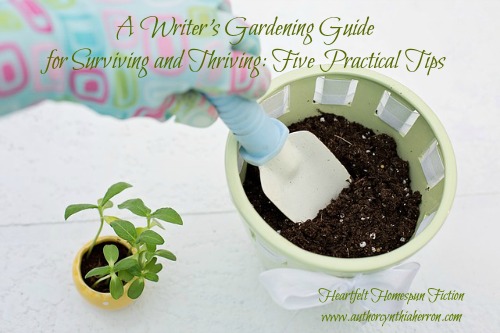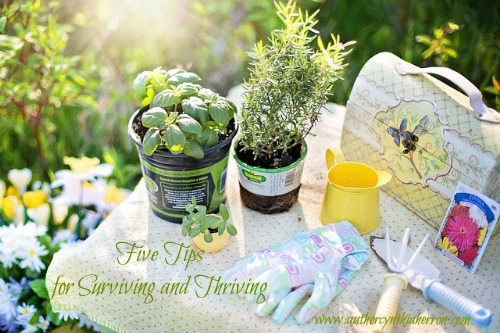I love beautiful plants, flowers, trees, and shrubs. I’m in awe of the people who grow them.
My mama is one of those people. She could transplant a brick and bring it back to life. (Well—she can raise a stick from the dead.) Despite the odds, green things thrive under her watchful eye.
Gardening’s never been my strong suit, but I do enjoy it. I used to enjoy more of it when time wasn’t such a precious commodity.
As I surveyed our back yard this week, I smiled and shook my head. Those nine pine trees we planted fourteen years ago must have grown another foot. (The tenth tree was uprooted by the last tornado that came through.)
Those pines have been through everything (two tornadoes, buckets of hail, multiple ice storms, frigid winters, and dry-as-a-bone summers) since we transplanted them from small twigs only a foot or so high in 1999. The tallest pine in our back field is now about twenty feet tall! Go figure.
I’ve wished countless times we’d purchased a hundred more of those scraggly white pines because we could have used them as a wind break around our property, but at the time, my husband and I had reservations whether the little buggers would really grow.
We paid $1.50 per tree. Other than some preliminary care and nurturing the first year, and some occasional mulching and pruning, those trees have continued to thrive despite everything they’ve been through.
Since building our home, we’ve planted forsythia, lilacs, yews, flowering crab apples, plum trees, several varieties of maples, and some other things. Sadly, one of the tornadoes destroyed our gorgeous weeping willow, and the voles, moles, or other varmints out this way dined on about three or four dozen of my kill-proof tulip and peony bulbs.
(Tip: if you live in Tornado Alley or the Ozarks—and out in the country—anything can happen. Life here is delightful, but it’s a mixed bag as far as weather conditions, climate, and critters go.)
I’ve learned that to thrive, plants, flowers, and trees, need a great leg up because it’s that initial care and nurturing that will enhance growth and likely determine survival. (This article gives fabulous tips on ways to grow healthy plants. Check out the hints about the banana peels, egg shells, and pennies. Who knew?)
What about those things (like our pines) that survive and adapt despite the odds?
How do people thrive and flourish in spite of hardship, turmoil, or unforeseen life events?
My friend Maude taught me about life. Particularly endurance. Maude rode out the storm and continued to press on, regardless of difficulty. She grabbed hold of life and gave it what for. Her salvation was her reference point, and with that in mind, she availed herself to new opportunities.
Maybe you know a Maude. Someone who’s going through a rough patch. Illness. Divorce. Job loss. Relationship issues.
If you’re a writer or a creative, perhaps, you’re disillusioned with the process. Possibly, you’ve had some hard knocks. Maybe you feel that the odds are against you. That life’s out of control.
While I don’t have the perfect answer, here are some practical gardening tips. Things you can do to maintain some semblance of balance, and not only survive—but thrive—despite the odds:
1. Pick a new pot.
If your current location inhibits you, move! Okay, maybe you can’t relocate to a new home, but if your creativity is stymied by where you’re at in life—physically or emotionally (a specific room, a naysayer’s company, an uninspiring place)—go somewhere else. The library, a coffee shop, that shade tree out back. Someplace that’s bright, cheery, and brimming with positivity.
2. Choose sunlight.
There’s nothing worse than dreary, down-in-the-mouth folks. I once worked in a profession that was anything but positive. Because of the nature of my job, I dealt with sad situations and unhappy people. I worked in an office with some pretty miserable people, too. The odds of burn-out were great. I endured my time in the desert for a season, but I soon developed a plan, and when the time was right, I chose a different path. A sunnier one. I found you can do anything for a season—and even thrive—when you know an end is in sight. But you can’t be lazy about it. You must be proactive.
3. Use the right fertilizer.
To thrive despite the odds, proper nutrition’s important. What works for someone else won’t be the right thing for you. A dozen “experts” will attempt to sell you the moon. Generally, there’s a reason for that, and it may not be what’s best for you. Try different methods. Sources of (healthy) energy that make a difference. If you notice marked improvement, odds are you’re onto something. Some things that work for me: protein bars (not the super-charged ones loaded with bad stuff), peanut butter, granola, and cheese sticks (in moderation unless they’re low-fat). Also—a word about skipping meals. Don’t! You’ll just end up eating more later.
Oh, and my personal philosophy—If bad ingredients (in addition, negativity) are the only things on the menu that day—I opt for the least unhealthy choice OR a different alternative. I rarely eat hot dogs, processed lunch meats, or fried, greasy foods that shout “heart attack!” And if given the choice, I prefer eating with upbeat people because atmosphere is huge for me.
4. Hydrate.
If you know a drought’s coming, don’t rely on Neighbor Nelly to share her well. Stockpile water, Powerade, juice—smart choices to quench your thirst. I’m a firm believer in drinking (no pun intended). My energy lags when my system’s depleted.
My pines have survived hot-as-blue-blazes weather and water-deprived days. There’s no way we could physically water them all. Not enough buckets with drainage holes, no in-ground sprinkler system, and our hoses don’t stretch that far. Somehow, those trees have beaten the odds. I’d like to think it was because we gave them a good start.
Sometimes, we must work with what we have And if that’s not much, we pray. And adapt. And soak up the downpour of blessing as it comes. And give thanks.
Remaining in a thankful mode during seasons of drought is crucial. It combats fear and unleashes hope.
5. Pay attention to detail.
Sometimes, to encourage new growth and ensure survival, it’s necessary to do a little pruning. I think my little pine trees survived (and thrived) over the years because of the preliminary measures we took when we transplanted them. We estimated a good location, dug the correct size holes, fertilized, watered often (when they were little trees they required less), and sprayed for pests.
Now that those trees are ginormous, about the only thing we’ve done in recent years is prune back some of the lower branches and trim undergrowth.
Over the years, I’ve learned in order to thrive details are important. I can’t adjust the big picture until I fix a couple of the small details first. When I re-center my thinking, I’m more likely to succeed.
In the grand scheme of things, thriving despite the odds isn’t so much about the circumstance as it is about mindset.
It requires effort.
Sometimes patience.
Resilience.
Tenacity.
Prayer.
Thriving despite the odds makes the conscious decision to refuse defeat.
***
PLEASE SHARE
Five things the diligent writer keeps in mind as he nurtures his “story garden.”
Disillusioned with the process? Five tips to stay on track.
ADDITIONAL ENCOURAGEMENT
Hope: 20 Reasons to Throw Open Your Windows
Downtime Dillydallying: 15 Tips for a Stress-Free Weekend
Have you ever thrived despite the odds?
What’s your advice to someone who might be struggling today?
***
Here’s to surviving and thriving! *clink*
Much Love and Many Blessings,





Comments 4
Nice analogy!
I guess I would offer three suggestions –
1) Always take the next step that is in front of you, but only that one step.
2) Never reassess in the middle of a crisis
3) Make excuses that allow you to succeed
Author
Andrew, those are excellent! #2 is so important. Snap assessments/decisions are never wise in a crisis.
Sweet, Cynthia. I love that Maude gave it “what for.” 🙂
Author
Shelli, Maude’s been gone a while now, but I can’t drive by her old place without thinking of my last conversation with her. She was definitely a strong, resilient lady.